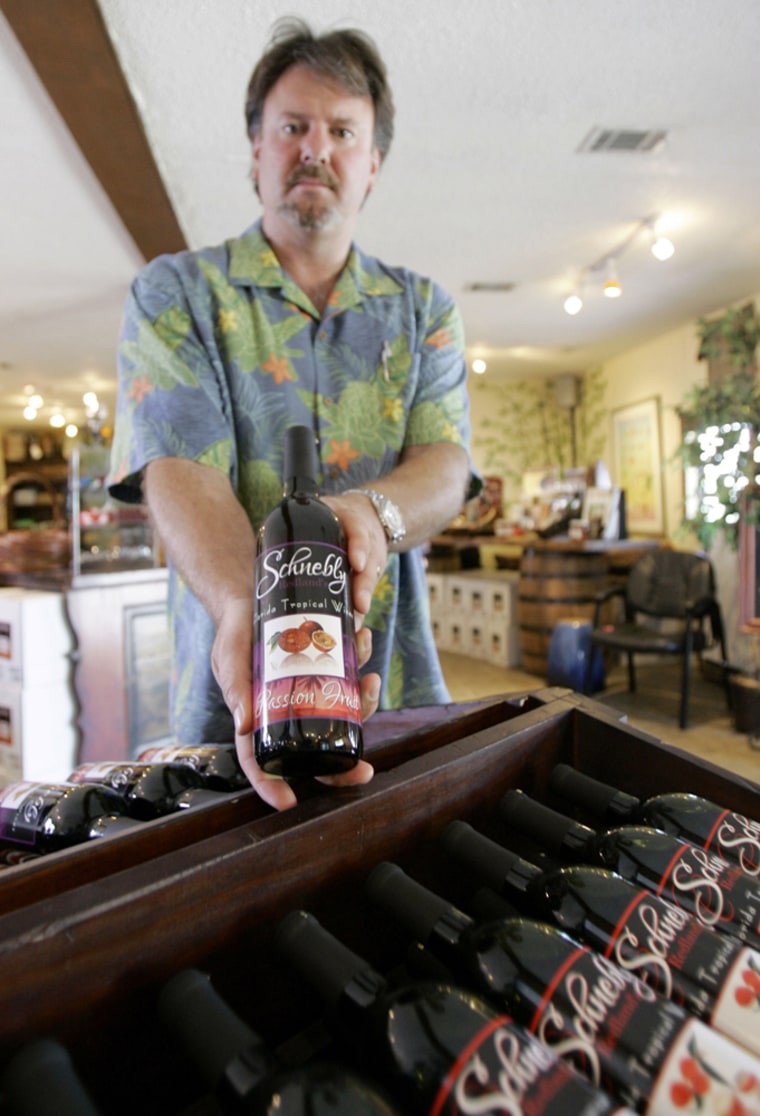For Peter and Denisse Schnebly, sweet dreams are made of this: wine, from carambola, lychee and mangoes that won’t grow in cooler climates.
Instead of using grapes, they’re embracing Florida’s agricultural strengths. In the process, they’re hoping to lure visitors away from the world-class beaches, international fashion designers and hot Latin sounds of South Beach to experience other aspects of the region’s natural beauty.
“Does it really matter what you made the wine from?” Peter said. “Isn’t it more important that you made a good wine?”
The Schneblys started selling their wine in 2005 to cut the waste from their tropical fruit orchards. The couple farms about 100 acres in the Redland area west of Homestead and got the idea to make wine a few years earlier from one of Peter’s friends who owned a winery in upstate New York.
Twenty to 40 percent of a tropical fruit crop can’t be sold because it’s either blemished or too ripe. Schnebly Redland’s Winery was started with fruit the couple would have thrown away, but they eventually expanded to buying fruit from neighboring farms.
“We had growers that were dumping this stuff away, and now we’re making wine out of that,” Denisse said. “And we’re paying them for it.”
The Schneblys started their produce company, Fresh King Inc., about 13 years ago, shortly after they were married. They had met in South Florida when Denisse, who is from Colombia, was working as a sales representative for a produce company and Peter, a New York native, was working as a buyer for a grocery chain. With years of experience between them, they started their own business.
The wine is made in a relatively small section of their 24,000-square-foot packing facility. The stainless steel fermenting tanks can hold 20,000 gallons. But because the couple uses a variety of fruits with different growing seasons, the winery can produce more than 100,000 gallons of wine annually.
Peter said he expects the winery to do about $1.2 million in sales this year.
The Schneblys weren’t the first ones to start using tropical fruit for wine. Florida Orange Groves Inc. and Winery in St. Petersburg has been at it for more than a decade, making wine from mango, guava and passion fruit, which are also on the Schneblys’ menu.
Schnebly wine has already met with success compared with other non-grape wines, pulling in several awards. But the couple hopes to break down the stigma that non-grape wines are somehow inferior.
“We’re not making any cheap wine,” Denisse said. “We’re making serious table wines that can be paired with food. And believe me, they will make food taste better.”
Allen Susser, head chef and proprietor of Chef Allen’s in Miami, believes the Schneblys are making more than a novelty wine. Besides selling their mango and passion fruit wines at his restaurant, which serves New World cuisine, Susser also likes to cook with them.
“It goes well with our food,” he said. “We have a lot of tropical food, fresh fish.”
Susser even provided the winery with a list of entrees to pair with the different wines. The carambola wine, he said, should be served with chicken or fish, while the lychee wine goes better with shellfish and Asian cuisine.
The Schneblys are now working to make the winery itself a destination for visitors.
Last year, they built a series of 18-foot-tall waterfalls that pour into a 120-foot-long pool — the entire structure made of coral rock, which is found throughout the Redland area. They also recently finished a massive tiki hut to shade visitors from the sun.
By August, work will be completed on a 5,000-square-foot building to serve as a new visitor’s center and tasting room. The space could also be used for hosting weddings, receptions and other events. The official grand opening is planned for November.
Besides trying to market Schnebly Redland’s Winery, the couple hopes to bring agrotourism to the area. Situated between the Everglades and Biscayne National Park, the Redland area, they say, is a perfect destination for tourists who want to get away from the beach for a day.
“The wine is just the sexiness on top of the whole thing,” Peter said. “We draw more attention because we’re a winery. If we were a pig farm nobody would care.”
The winery has joined with nine other local attractions to lure potential visitors with more than one destination in mind. Attractions on the Historic Redland Tropical Trail include an alligator farm, Monkey Jungle, bonsai garden and the Coral Castle, a historic home carved in stone.
Miami-Dade County Commissioner Dennis Moss, whose district includes the Redland area, sees agrotourism as a way to help growers resist pressure from developers.
“People will continue to keep agricultural land for agriculture as long as it remains profitable,” Moss said.
Cutting farm waste with a winery is a good step in keeping local farms prosperous, he said, and it could eventually lead to bed and breakfasts, farmers’ markets and other retail opportunities.
